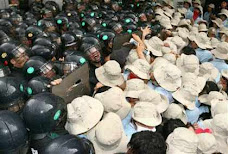
Past time for speaking out on Beijing's rights abuses
Tuesday, July 29, 2008
Two weeks before he goes to the Beijing Olympic Games, President George W. Bush remains unacceptably silent about China's crackdown on basic human rights. Emboldened by the complicity of Bush and other leaders, China is harassing or locking up critics, threatening journalists and selectively denying visas.
We have not taken issue with Bush's decision to attend the Olympics. But his refusal to speak out publicly and clearly about China's repressive behavior is an abdication of leadership and a blot on his record.
Bush has sought to portray himself as just another sports fan eager to cheer on his nation's team who is unwilling to use the Olympics to make political points. It's ludicrous for a president to pretend to be just another fan - and no one has sought to gain more political advantage from the Games than China.
The situation bordered on the absurd last week when Bush delivered a lengthy address on his "freedom agenda" for the world. He spoke loftily about the need for America to lead the cause of freedom and human rights, but he made only a brief reference to China. His insistence that those who "languish in tyranny" are not alone likely was little solace to Hu Jia and other imprisoned Chinese rights activists.
Bush's "freedom agenda" has always been selective. It has focused more on smaller countries than on major powers like China and Russia, whose help the administration needs on other matters. He insists that he regularly shares his human-rights concerns in private with China's leaders, but it's had little positive effect. A report by Amnesty International on Monday is the latest to scold China for not keeping its pre-Olympic pledges to expand press freedoms for foreign reporters. When they were competing to host the Games, Chinese authorities also implied that they would expand human rights more generally, but that, too, was false marketing.
In 2005, the Bush administration wisely challenged China to become a responsible stakeholder in the international system and to make its government responsible and accountable to its people. After pulling his punches on the Olympics, aides say that Bush is expected to address the human-rights concern.
It should not be an issue. Bush should make his views known publicly. And if he attends church in Beijing, as his staff says he might, he should also meet the families of jailed dissidents. This may be his last chance to take a stand on China and human rights.
Tuesday, July 29, 2008
Two weeks before he goes to the Beijing Olympic Games, President George W. Bush remains unacceptably silent about China's crackdown on basic human rights. Emboldened by the complicity of Bush and other leaders, China is harassing or locking up critics, threatening journalists and selectively denying visas.
We have not taken issue with Bush's decision to attend the Olympics. But his refusal to speak out publicly and clearly about China's repressive behavior is an abdication of leadership and a blot on his record.
Bush has sought to portray himself as just another sports fan eager to cheer on his nation's team who is unwilling to use the Olympics to make political points. It's ludicrous for a president to pretend to be just another fan - and no one has sought to gain more political advantage from the Games than China.
The situation bordered on the absurd last week when Bush delivered a lengthy address on his "freedom agenda" for the world. He spoke loftily about the need for America to lead the cause of freedom and human rights, but he made only a brief reference to China. His insistence that those who "languish in tyranny" are not alone likely was little solace to Hu Jia and other imprisoned Chinese rights activists.
Bush's "freedom agenda" has always been selective. It has focused more on smaller countries than on major powers like China and Russia, whose help the administration needs on other matters. He insists that he regularly shares his human-rights concerns in private with China's leaders, but it's had little positive effect. A report by Amnesty International on Monday is the latest to scold China for not keeping its pre-Olympic pledges to expand press freedoms for foreign reporters. When they were competing to host the Games, Chinese authorities also implied that they would expand human rights more generally, but that, too, was false marketing.
In 2005, the Bush administration wisely challenged China to become a responsible stakeholder in the international system and to make its government responsible and accountable to its people. After pulling his punches on the Olympics, aides say that Bush is expected to address the human-rights concern.
It should not be an issue. Bush should make his views known publicly. And if he attends church in Beijing, as his staff says he might, he should also meet the families of jailed dissidents. This may be his last chance to take a stand on China and human rights.































No hay comentarios:
Publicar un comentario